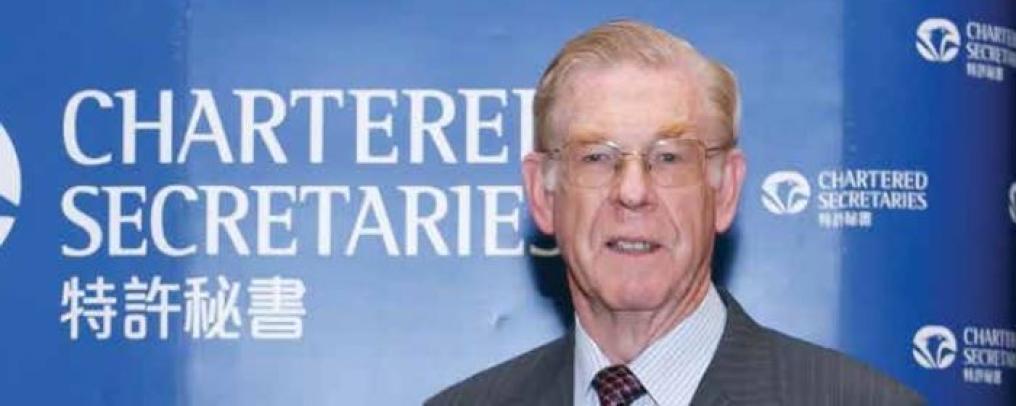In her keynote speech at this year's 'Asian Company Secretary of the Year' awards, Edith Shih, Head Group General Counsel and Company Secretary at Hutchison Whampoa Ltd and HKICS Past President, highlighted the need for company secretaries to have the courage to speak out on governance issues.
First of all, a big 'thank you' to Corporate Governance Asia for organising this event to recognise Asian company secretaries and thank you also for this opportunity to share some of my thoughts on our profession.
I work for the Hutchison Whampoa group, a multinational conglomerate based in Hong Kong operating in 52 countries, with 270,000 employees. I am currently President of the Hong Kong Institute of Chartered Secretaries, a governance institute with about 6,000 full members and 3,000 student members. The Institute of Chartered Secretaries and Administrators (ICSA), of which I am Vice-President, as you may be aware, is the parent institute of many Asian Chartered Secretary institutes, covering 70 countries with more than 33,000 members worldwide.
During my formative years, my career focused entirely on the legal front. I was in private practice for a number of years before I joined Hutchison Whampoa as general counsel, a post I have held for 21 years. Of course, as general counsel, I had to deal with company secretarial work in my daily work, but not as a company secretary. I eventually became company secretary of the Hutchison group in 1997, almost 18 years ago now. Over the past 18 years, I have witnessed a transformation of the role of the company secretary from a clerical and administrative personnel to a regulatory, compliance and governance specialist.
I remember an incident some 15 years ago on a business trip to Xiamen with my group managing director to see the then Xiamen mayor and now the Governor of the People's Bank of China, Mr Zhou Xiao Chuan. As most government officials, or for that matter anyone, would be wary of receiving visitors with the title 'general counsel', I also carried a business card with only the title 'company secretary'.
At the meeting, we discussed our business operations in Xiamen, comprising Xiamen Container Terminals and Watson's shops. Mr Zhou was very personable and was prepared to spend more time with us for deeper discussions but our time was limited as we had to leave for our next meeting. As we left the mayor's office, Mr Zhou said, 'Ms secretary, can you make sure that there is ample time for our meeting next time. The arrangements this time are not very satisfactory – too rushed'. I looked around and realised, since I was the only female in sight, that he must have been referring to me as 'Ms secretary'. So I hurriedly replied, 'so sorry, yes, of course, I will make better arrangements next time'.
A more recent incident took place last year when I attended the annual dinner of the Hong Kong Institute of Engineers as president of Hong Kong Institute of Chartered Secretaries. As usual, I was placed at one of the head tables, seated with other institute presidents and senior academics in the industry. Next to me was the vice-chancellor of a local university. Over dinner, we had a very good exchange of views on the local tertiary education system. As it appeared to me that the vice-chancellor didn’t know very much about Chartered Secretaries, I gave him my usual spiel on our profession. Towards the end of the dinner, he thanked me for the information on the Chartered Secretarial profession and admitted that, at the start of the dinner when we exchanged business cards, he was wondering why a secretary was invited to sit at the head table.
So over my career, and still today, because of the use of the term 'secretary', the job functions and status of company secretaries are still very much misunderstood. The company secretary today is not the clerical personnel of some 20 to 30 years back; we have become a trusted and professional adviser to the chairman and the board on all governance matters.
Let's look at the UK in the 1990s. Those of us who are old enough to have been working then may remember the demise of Robert Maxwell and the £440 million hole found in the Mirror Group's pension funds. This led to the Cadbury report in 1992 on the financial aspects of corporate governance. It was in this report that independent non-executive directors (INEDs), along with company secretaries, were given prominent roles. In relation to company secretaries, the Cadbury report states: 'The chairman and the board will look to the company secretary for guidance on what their responsibilities are under the rules and regulations to which they are subject and how those responsibilities should be discharged'. The report then goes on to state that 'the company secretary will be a source of advice to the chairman and to the board on the implementation of the Code of Best Practice'.
In 1994, after the Maxwell saga, the Hong Kong Institute of Chartered Secretaries was incorporated by a number of ICSA members in Hong Kong, with the objective of promoting company secretaryship and corporate governance.
If we fast forward 20 years from our establishment to today, we will see that it is a requirement under the Companies Ordinance of Hong Kong and the listing rules of the Hong Kong stock exchange that all limited companies and listed companies must have a company secretary who is responsible for advising the board through the chairman and/or the chief executive on governance matters.
In recent years, we have seen a strong focus on corporate governance in Asian countries. The Corporate Governance Code for Hong Kong was first introduced in 2005 and substantially updated in 2012, with many provisions stepping up from recommended best practices to code provisions, and from code provisions to rules. The recent topics of focus include board diversity, risk management principles for internal control and ESG reporting. These are in addition to the implementation of the statutory disclosure regimes of the Securities and Futures Commission and many other rule amendments. In Australia, similarly, the third upgrade of the Corporate Governance Principles and Recommendations is being implemented this year. And different Asian countries are doing the same in different degrees and at different levels. The reality is that chairmen, CEOs, CFOs, directors and colleagues are all increasingly turning to us for governance advice.
As company secretaries, we have had to equip ourselves properly for the role, learning new laws and new rules, and ensuring that we understand the requirements of the authorities and regulators, not just in form, but in their true spirit and intent.
Of course, just knowing the requirements and understanding their application is not enough. We could recite the requirements beautifully and dissect issues and determine contraventions or breaches accurately, but if we do not have the courage and integrity to tell our directors, our chief executives, and our chairmen what they do not wish to hear; if we are afraid of the wrath of the howling directors so that we dare not take action to prevent a breach from being committed, we cannot be the gatekeeper and the conscience of the company. I know this is a difficult task, but this is how we earn our respect and how we have been relied upon to defend the good name and reputation of the company.
That is why it gives me great pleasure to support Corporate Governance Asia and this award ceremony tonight. We are here to give recognition where it is due. That is, to all of the recipients as Asia's finest company secretaries. So 'congratulations', and a big round of applause to all our recipients. The recognition along with this award is well deserved.
In connection with my little anecdotes about being mistaken for a personal secretary, I would like to close by bringing everyone up to date as to new developments in this area. After a number of years of empirical research amongst their membership, some Chartered Secretarial institutes, including ICSA UK, The Australian Institute of Chartered Secretaries and the New Zealand Institute of Chartered Secretaries have been pondering, or acting on, a change in the name of their institutes for some time. Australia, for example, has recently rebranded itself as the Governance Institute of Australia. New Zealand has just obtained regulatory approval to proceed with a change of name to Governance New Zealand Incorporated. I foresee that ICSA UK and HKICS will play a pivotal role with other ICSA divisions on a conversation as to whether we should be rebranded as 'governance professionals' as well.
But this will take all of us to continue our good work and contributions, which is being recognised beginning with these awards this evening. I hope you will keep in touch with HKICS and myself to keep the momentum of the conversation going, and also to bring about changes in your respective jurisdictions where appropriate. Let us know if we can help in any way.
Again, thank you all and heartfelt congratulations to the recipients of the award and to Corporate Governance Asia, along with everyone who has assisted in this award ceremony. And may I take this opportunity to wish everyone a blessed holiday season and a prosperous 2015.
Thank you.
Edith Shih, Head Group General Counsel and Company Secretary at Hutchison Whampoa Ltd
The 2014 'Asian Company Secretary of the Year' award, organised by Corporate Governance Asia, was held on 10 December 2014 at the Renaissance Harbour View Hotel, Hong Kong.



